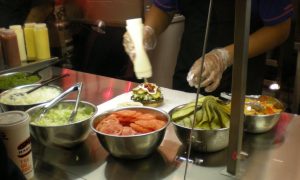Number of impacted people working in fast food: 3.7 million in the US
With the high variety of fast food chains providing many people with a job that pushes them above the poverty line – one can obviously debate whether this is justifiable – many of these companies absorb a large quantity of low skilled workers.
That is soon to change as ‘hamburger robots‘ are poised to disrupt the fast food industry. Yes, these hamburger robots are everything you imagine them to be. They replace the need of anyone working in the fast food restaurant entirely. Everything will be automated, from ordering and preparation to delivery.
What Do Hamburger Robots Look Like?
Or will it? You may imagine seeing a humanoid robot but this type of machine is a typical example of an automated assembly line, something we’ve already known for many years in the car manufacturing industry.
 Already today, you can enter your order while queuing and then pay for it in large fast food restaurants. However, did you know that a company called Momentum Machines presented its fully automated hamburger preparation robot as far back as 2012? In just a few minutes, the hamburger robot can grill the beef, add the vegetables and sauce, put it all in a bun and wrap it up.
Already today, you can enter your order while queuing and then pay for it in large fast food restaurants. However, did you know that a company called Momentum Machines presented its fully automated hamburger preparation robot as far back as 2012? In just a few minutes, the hamburger robot can grill the beef, add the vegetables and sauce, put it all in a bun and wrap it up.
One of the co-founders of the company, Alexandros Vardakostas, is quite clear about their ambition: “Our device isn’t meant to make employees more efficient; it’s meant to completely obviate them.”
Fast Food Is Not Only Hamburgers
Of course, fast food is more than just hamburgers. What about the other fast food favourite, pizza? Here, the story is similar. Pizzametry creates pizza vending machines which effectively have the potential of replacing all of the pizza preparers in both restaurants and fast food chains.
Do We Want Hamburger Robots?
The benefits are clear. With the introduction of these machines we can increase the food quality in many ways. Adding sensors will ensure that the meat is sufficiently cooked, the vegetables are fresh and fewer diseases are transferred from unhygienic situations (Did you know that 1 in 5 among us doesn’t wash their hands after going to the toilet?)
Also, the production speed will increase lightly enabling us to feed more mouths at a lower cost. When the cost of production goes down, some businesses may actually invest in the ingredients, meaning higher quality food at the same cost.
The reason not to go ahead with this is also clear: without economic reform or additional measures, these people will lose the small income they earn.
Want more?
Why do you work? Do you know the answer to that question? Maybe you get up every morning for financial security or because you want to connect to people. Or is it because you want to grow? Find out your answer by using the Happonomy Value Canvas!


Leave a reply